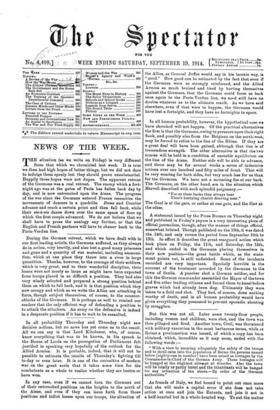In all human probability, however, the hypothetical case we have
sketched will not happen. Of the practical alternatives the first is that the Germans, owing to pressure upon their right flank, and possibly also from the Belgians on the north-west, may be forced to retire to the line of the Rhine. If they are a great deal will have been gained, although that line is of tremendous strength. The other alternative is that the two armies will be held in a condition of unstable equilibrium on the line of the Aisne. Neither side will be able to advance, and there may be for several weeks a series of indecisive actions over one hundred and fifty miles of front. That will be very wearing for both sides, but very much lees for us than for the Germans. We have not a menacing foe at our back. The Germans, on the other band, are in the situation which Marvell described with such splendid poignancy :— "For at their backs they always hear Time's hurrying chariot drawing near."
The Gaul is at the gate, or rather at one gate, and the Slav at the other.


































